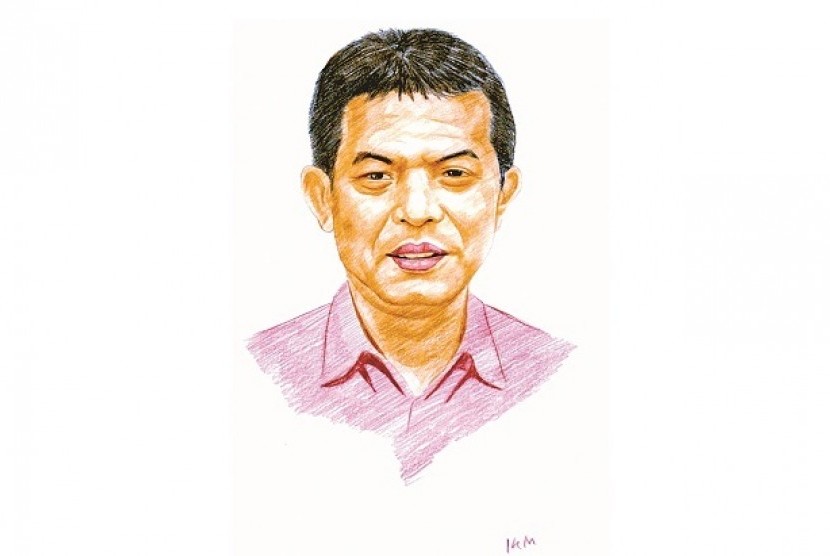REPUBLIKA.CO.ID, REPUBLIKA.CO.ID, By Ikhwanul Kiram Mashuri
What I mean by Turkish Erdogani is Turkey during the reign of Adelet ve Kalkinma Partition (AKP) aka Justice and Development Party led by Recep Erdogan Tayib. The Islamist party won the election in 2002. The victory which then delivers Erdogan became Prime Minister and Abdullah Gul as President. During the 12 years of rule of the Erdogan-Gul duo, Turkey is progressing very rapidly and become the center of democracy for Muslim majority countries.
Their progress, among others, can be seen in the following data. The per capita income of the Turkish people 12 years ago only 3,000 dollars, now - in the past 12 years Erdogan government - it has reached more than 14,000 dollars. For comparison, in 2004 Indonesia's per capita income was 1,100 dollars, and then in 2012 rose to 3,592 dollars. At the end of 2014 is expected to increase approaching 5,000.
Turkish economic growth is above the average 6 percent/year in the last 12 years. Compare it with European countries that the average economic growth does not reach 1 percent. In fact, Turkey 12 years ago was dubbed by the West as a sick state, now it's a seventh economic power in Europe. The unemployment rate is also very low. That's why now in the streets of Ankara and Istanbul, it is easy to find immigrants of Eastern Europe who are working for their livelihood in Turkey.
With such achievements, it's not strange when then the AKP won the elections in the last 12 years. Elections in Turkey held every four years. In the three elections the AKP always win. The victory continues to increase in every election, from only a major winner to an absolute majority.
However, ahead of the local elections on March, suddenly in last mid-December, the world was shocked by the news of the arrest of 52 people on charges of corruption. What matters were; those who were arrested by the police, among others, three ministers and two prominent businessmen who are known close to the Erdogan government. They were allegedly involved in kickbacks to win government tenders.
News of the arrests was certainly surprised because during the Erdogan era, he is known as the most intense to combat corruption, especially against members or AKP leadership. Erdogan was furious. He calls this corruption investigation as a smear campaign, especially as Turkey will face local election. The election will be a test for Erdogan and the AKP's popularity before next general elections in August. He asserted, he will not bow to any pressure.
Erdogan Government was then doing a series of clean-up in the police body. Last week 350 police officers were laid off. Among other; head of financial crimes unit, anti smuggling unit, and organized crime unit. Previously, five senior police officers have also been fired, including the head of the unit who led the investigation of corruption and police chief of Istanbul. Until now, 700 police officers were fired. This action seems as government efforts to minimize the impact of corruption investigation.
The aftermath of the corruption scandal, three ministers resigned because their children were arrested. PM Erdogan - and President Gul - then replaced half of the members of his cabinet a few days later.
Erdogan accused there is a huge conspiracy involving foreign parties who wish to worsen the image of the AKP government ahead of local elections in March. It’s a deliberate conspiracy to create divisions amongst the ruling party. In fact, he said, they were like a state within the state.
Although not naming names, but the number of media mentioned; what Erdogans meant for conspiracy involving one name: Fathullah Gulen. The latter is a Turkish Muslim scholar who is now in exile in Pensylvania, USA.
Before settling in the US in 1999 for medical treatment, the man who was born on 27 April 1941 in the city of Erzurum, eastern Turkey, was an active preacher. He has toured in almost all regions in Turkey. In addition to preaching in mosques, he gave public lectures, and teaching, Gülen is also a prolific writer about various things. Numerous works have been translated into many foreign languages, including Indonesian. In addition, Gulen was established many charitable institutions, social, educational, and economic.
As Sunni scholars, Gülen has very moderate views. He upheld religious tolerance and plurality of society. He also mobilized parties for dialogue between faiths and beliefs (interfaith dialogue), in order to create world peace. He opposed violence, moreover, terrorism, on whatever pretext.
Gulen followers spread all over Turkey and from all walks of life, from ordinary people, businessmen to officials, whether in government, police, military, and within the legal apparatus. Their role is also very large on supporting AKP, the Islamist party, to win 2002 election. It's a victory which then deliver Erdogan to became PM and AKP as the ruling party.
In a sense, the role of both - Gulen and Erdogan - is very fit to fight for Islam in a secular state. They are complementary. Gulen represents 'cultural Islam', and Erdogan represents 'political Islam'. They are working very nicely and then make Turkey as a developed and respected state; a secular state with an Islamic government.
That's why, the news of the arrest of the people close to Erdogan replied by the dismissal of about 700 high-and medium-sized police officer is shocking. Moreover, behind all of it, then the news about the outbreak of a joint cooperation between Erdogan and Gulen camp emerged. According to some observers, this split is a tough test for Erdogan and the AKP and more danger than demonstrations organized by the secular-liberal in June last year.
It's not actually known for certain as to what really happened between these two charismatic figures. However, we expressed deep concern with what is happening in Turkey today. Moreover, the split between the two Islamic leaders will surely weaken the Islamic-leaning government. We worry about the slogan; that Muslims are, indeed, hard to unite.


